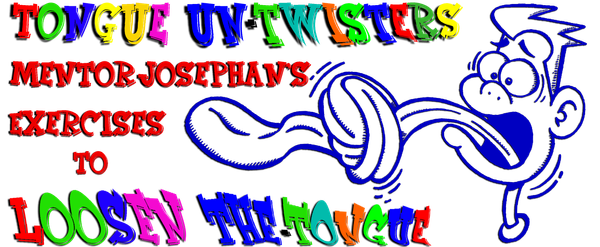0

Mentor Josephan's Tongue Un-Twister of The Day
5 年前Mentor Josephan's Tongue Un-Twister of The Day

Here is the 1st of the Tongue Un-Twister series. It will help to perfect your pronunciation of the [th] sound.
Something in a thirty-acre thermal thicket of thorns and thistles thumped and thundered threatening the three-D thoughts of Matthew the thug - although, theatrically, it was only the thirteen-thousand thistles and thorns through the underneath of his thigh that the thirty year old thug thought of that morning.
The Tongue Twister
An arrangement of alliterative (the first consonant is usually repeated) words, or sentences, that are difficult to pronounce quickly and correctly might be referred to as a tongue twister.
As a voice coach, I stress to my learners the importance of thinking of one’s pronunciation practice as being vocal muscle exercises as well as articulation practice. If you want to master a sport, a musical instrument, a dance, or any activity requiring muscle development and coordination of the senses and the brain you must be committed to long hours of practice. Learning to “speak” a new language is no different – practice makes perfect.
Tongue twisters as a form of vocal exercise strengthen and stretch your speech muscles.
The brain coordinates its articulation of words with the muscles it needs to move. Sounds that use the same or similar muscles can confuse the brain. Tongue twisters can help you to pronounce words more clearly, help you to develop better speech patterns, and train your brain and voice muscles to overcome the sounds most challenging to you.
Beginning with this post I will post a new tongue twister every day (everyday I have time) until I either run out of new tongue twisters to add, or, I determine this audience is not paying any attention to them, or, I am otherwise overwhelmed with my work.
I’ll begin with some advice for practicing tongue twisters.
1. Start by reading them slowly making sure to pronounce the beginning and the end of each word strongly.
2. Read them aloud several times saying them faster with each repetition.
3. Emphasize pronouncing each word as clearly as possible.
4. If you make a mistake start over each time until you overcome the stumble.
5. Practice each tongue twister until you can pronounce it accurately and fast.
6. Have fun practicing and feel free to laugh at your mistakes.
As an English speech professional, I use tongue twisters as part of my warm-up routine before recording sessions or giving a speaking presentation. Most professional speakers, actors, and actresses use tongue twisters as a warm-up, so regardless of your English-speaking proficiency Mentor Josephan’s “Tongue Un-Twister of The Day” should be of use to all.
